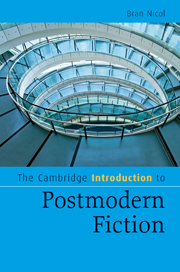Book contents
- Frontmatter
- Contents
- Acknowledgements
- Preface: reading postmodern fiction
- Introduction: postmodernism and postmodernity
- Chapter 1 Postmodern fiction: theory and practice
- Chapter 2 Early postmodern fiction: Beckett, Borges, and Burroughs
- Chapter 3 US metafiction: Coover, Barth, Nabokov, Vonnegut, Pynchon
- Chapter 4 The postmodern historical novel: Fowles, Barnes, Swift
- Chapter 5 Postmodern-postcolonial fiction
- Chapter 6 Postmodern fiction by women: Carter, Atwood, Acker
- Chapter 7 Two postmodern genres: cyberpunk and ‘metaphysical’ detective fiction
- Chapter 8 Fiction of the ‘postmodern condition’: Ballard, DeLillo, Ellis
- References
- Index
- Cambridge Introduction to …
Chapter 5 - Postmodern-postcolonial fiction
Published online by Cambridge University Press: 05 June 2012
- Frontmatter
- Contents
- Acknowledgements
- Preface: reading postmodern fiction
- Introduction: postmodernism and postmodernity
- Chapter 1 Postmodern fiction: theory and practice
- Chapter 2 Early postmodern fiction: Beckett, Borges, and Burroughs
- Chapter 3 US metafiction: Coover, Barth, Nabokov, Vonnegut, Pynchon
- Chapter 4 The postmodern historical novel: Fowles, Barnes, Swift
- Chapter 5 Postmodern-postcolonial fiction
- Chapter 6 Postmodern fiction by women: Carter, Atwood, Acker
- Chapter 7 Two postmodern genres: cyberpunk and ‘metaphysical’ detective fiction
- Chapter 8 Fiction of the ‘postmodern condition’: Ballard, DeLillo, Ellis
- References
- Index
- Cambridge Introduction to …
Summary
Postcolonialism is concerned with the processes of colonization and its effects on different societies and cultures. Its focus is primarily on how the colonial experience has shaped not just the former colonies of Europe, but colonizing countries such as Britain, and ‘settler’ nations like the United States, Canada, Australia, New Zealand, and South Africa. It is important to acknowledge that the ‘post’ in postcolonialism does not refer simply to a historical period after the colonial rule of a particular country is over, such as, for example, post-August 1947 when India secured its independence from Britain. The colonial process, theorists insist, is never ‘over’ in the way a single event is over but is continual. India, in a variety of social, political, and cultural ways (we might consider the assassination of Benazir Bhutto in late 2007, for example) is still subject to the effects of Empire.
When it comes to literary criticism and theory, postcolonialist reading strategies concentrate on specific representations and debates in literary texts. Representation, whether through the media, art, or other cultural practices, is a crucial and powerful means of maintaining control over a people – but also a way by which the colonized can resist, subvert, or critique the colonial process.
- Type
- Chapter
- Information
- The Cambridge Introduction to Postmodern Fiction , pp. 121 - 139Publisher: Cambridge University PressPrint publication year: 2009



